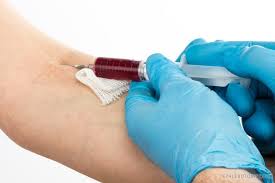What is the process to become an Phlebotomist?
Below we cover the steps to become a phlebotomist.
STEP 1 – Get or Have your H.S. diploma or GED
This is a must and without it you cannot become a working certified phlebotomist.
STEP 2 – Take accredited Phlebotomy Training
Selecting the right program for you is important and the National Accrediting Agency for Laboratory Sciences oversees and accredits all phlebotomy courses. Check the cost, availability, location and what time schedule you will have before you decide on a training program. Below is a link to a database of accredited schools from the National Accrediting Agency for Laboratory Sciences.
About Online Phlebotomy Classes
You can take some course online for phlebotomy. But they are only general education courses. The core portions of training are clinical and are done in person so you can learn the techniques in a hands on environment. For more details about online training for phlebotomy click here.
Step 3 – Complete the Phlebotomy Training and Prep for Certification Exam
After successfully passing the accredited training program you will be eligible to take the phlebotomy certification exam. It is important that you study hard for the exam for it is the most important thing employers are looking for today in new phlebotomists.
Step 4 – Pass Phlebotomy Certification Exam Get Certified!
The National Center for Competency Testing (NCCT)
The National Phlebotomy Association
The American Society for Clinical Pathology (ASCP)
The American Medical Technologists (AMT)
The National Healthcareer Association (NHA)
Each of the certifications offered by these bodies are accepted by employers. Again, if you live in CA, LA, NV and WA, see your state board for specific information regarding certification.
What is a Phlebotomist and What do they do?
There may be some out there that are wondering what a phlebotomist is and what they actually do. The core job of a phlebotomist is to draw blood from patients. Blood is drawn for many reasons such as, testing, research or blood donation. They also need to be ready for patients to have adverse reactions to blood being drawn. It is common for people to faint or get uncomfortable around blood and needles. Being calm and carefully explaining what you are doing is really advantageous to the job as a phlebotomist. Below we cover the specific job duties for phlebotomists.
Phlebotomist Job Description and Duties
Draw blood from patients and donors
Explain what you are doing to patient to relieve any stress surrounding venipuncture procedures
Verify patient or donor identity
Properly label all drawn blood
Enter any and all necessary patient information
Maintain and clean work area and supplies (needles etc.)
Step 5 – Finding a job as a Phlebotomist
Hospitals 37%
Laboratories 32%
Other Healthcare services 15%
Offices 8%
Outpatient care centers 2%
About Phlebotomists salary
At 25% growth, the field of venipuncture is doing great for phlebotomist! BLS.gov predicts great things in the future! Find out more below!
What is the average salary for a Phlebotomist?
The average phlebotomist’s salary is $33,670 per year and the average hourly wage is $16.19 per hour.
Phlebotomist’s salary by state
Area Name / Hourly Avg. Wage / Annual Avg Salary
Alabama / $14.17 / $29,470
Alaska / $20.81 / $43,290
Arizona / $15.59 / $32,430
Arkansas / $13.82 / $28,750
California / $20.86 / $43,380
Colorado / $16.8 / $34,930
Connecticut / $19.41 / $40,370
Delaware / $18.32 / $38,100
Florida / $15.22 / $31,660
Georgia / $18.18 / $37,810
Hawaii / $15.23 / $31,680
Idaho / $16.91 / $35,180
Illinois / $15.36 / $31,940
Indiana / $14.57 / $30,310
Iowa / $15.72 / $32,690
Kansas / $14.59 / $30,340
Kentucky / $14.13 / $29,390
Louisiana / $14.41 / $29,970
Maine / $18.52 / $38,510
Maryland / $19.1 / $39,720
Massachusetts / $15.14 / $31,500
Michigan / $18.15 / $37,740
Minnesota / $13.35 / $27,770
Mississippi / $15.21 / $31,630
Missouri / $15.74 / $32,730
Montana / $15.26 / $31,730
Nebraska / $17.92 / $37,260
Nevada / $19.42 / $40,390
New Hampshire / $18.4 / $38,280
New Jersey / $13.95 / $29,010
New Mexico / $18.85 / $39,200
New York / $14.76 / $30,700
North Carolina / $14.58 / $30,330
North Dakota / $15.86 / $32,990
Ohio / $14.51 / $30,180
Oklahoma / $18.49 / $38,450
Oregon / $16.43 / $34,180
Pennsylvania / $18.88 / $39,260
Rhode Island / $13.48 / $28,040
South Carolina / $14.13 / $29,400
South Dakota / $15.28 / $31,780
Tennessee / $14.43 / $30,010
Texas / $16.87 / $35,100
Utah / $16.53 / $34,380
Vermont / $18.26 / $37,980
Virginia / $14.41 / $29,970
Washington / $16.66 / $34,650
West Virginia / $15.64 / $32,520
Wisconsin / $15.81 / $32,890
Wyoming / $15.17 / $31,560
Source: www.bls.gov
Recommended Phlebotomy Schools Near You
Phlebotomy Training Information By State


